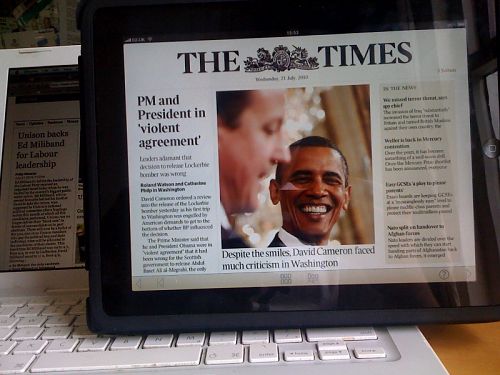
Here at Fusion Media; we are often asked by clients which is better – print or online coverage? Christopher Bassett, Managing Director at Fusion Media, considers the issues of print versus online.
I have a problem. As a PR professional I need to change the way I think about press coverage – I’ve been trying for some time now, but it’s hard.
 I’ve been in PR for almost 13 years and I still get excited when I see a piece of editorial coverage that I know is a direct result of a press release I’ve written, an interview I’ve set up or a call I’ve made to a journalist or editor.
I’ve been in PR for almost 13 years and I still get excited when I see a piece of editorial coverage that I know is a direct result of a press release I’ve written, an interview I’ve set up or a call I’ve made to a journalist or editor.
However, the cuttings I get really enthusiastic about are the ones in print – it doesn’t matter if it’s on the glossy pages of a business magazine or the thin pages of a newspaper – to me, they are the press cuttings that count.
I don’t feel the same when I get a Google alert linking to an online article mentioning any of our clients, even if it is great coverage. There is still a little voice in my head – one I’ve been trying to silence for several years – that says “Shame it’s only online,”.
I know that voice is wrong. I am a huge fan of social media (probably too much of a fan as I’m currently nursing a Twitter-related repetitive strain injury) so I see how quickly news spreads across social networks. Whether it’s re-tweeted, shared, pinned or even e-mailed, online coverage can spread globally in a matter of hours.
Good news travels fast
I also know that if a story is picked up by a national newspaper’s website, it will often lead to many more articles on numerous specialist sites that link back to the original text. Obviously that isn’t always a positive thing – bad news probably travels even faster than good news and can be blown out of all proportion very quickly in a series of Chinese whispers.
Another advantage, or disadvantage depending on the nature of the story, to online coverage is that it is available to readers almost indefinitely. Unlike printed coverage which will probably have a shelf life of a month at best before being recycled, websites keep stories online for years.
There’s also the small matter of engagement. Whether through a news website’s own comments section or through social networks, a company can receive instant feedback from readers, correct any misconceptions and add to the story where necessary. Of course, organisations can also post news to their own websites or blogs, allowing them to have complete control over the content, but these sites are likely to have a much lower readership than established news websites.
Measuring readership
It is impossible to know how many people are actually reading coverage generated. Printed publications often publish their circulation figures but that doesn’t tell you how many people read a particular article – nobody can tell you that.
Likewise, websites publish their readership figures but, again, it’s not easy to find out how many people have read a specific story. The amount it is shared should give you a good indication of its popularity but it is not an exact science.
Depending on your relationship with a website, there’s always a chance that you could gain access to the exact number of click-throughs on a story, as you would if you were placing an online advert.
Is print dead?
So will I be able to silence that little voice in my head? Not yet. I cherish the printed cuttings I get because with falling advertising revenue and drops in pagination, they are precious and not always easy to achieve. A front page cutting is still a cause for celebration.
There are also plenty of people who prefer to read an actual newspaper with their morning coffee or take a magazine home at the end of the day. They might not have time to read news online or – perish the thought – they don’t use social media.
This is why, at least for the time being, it’s important to gain media coverage both online and in print. And that’s what I shall continue to strive for on behalf of our clients.
If you want a marketing partner that is passionate about helping you grow your business then get in touch. It’s what we’re best at.





